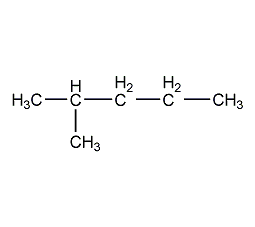2-Methylpentane 2-Methylpentane


Structural formula
| Business number | 02VT |
|---|---|
| Molecular formula | C6H14 |
| Molecular weight | 86.18 |
| label |
isohexane, Isohexane |
Numbering system
CAS number:107-83-5
MDL number:MFCD00009406
EINECS number:203-523-4
RTECS number:SA2985000
BRN number:1730735
PubChem number:24885746
Physical property data
1. Properties: Colorless, transparent and volatile liquid. [1]
2. Melting point (℃): -153.7[2]
3. Boiling point (℃): 60.3[3]
4. Relative density (water = 1): 0.65[4]
5. Relative vapor Density (air=1): 3.0[5]
6. Saturated vapor pressure (kPa): 53.32 (41.6℃)[6]
7. Heat of combustion (kJ/mol): -4153.7[7]
8. Critical temperature (℃): 224.3[8]
9. Critical pressure (MPa): 3.10[9]
10. Octanol/water partition coefficient: 3.21 [10]
11. Flash point (℃): -32 (CC) [11]
12. Ignition temperature ( ℃): 264[12]
13. Explosion upper limit (%): 7.0[13]
14. Explosion Lower limit (%): 1.0[14]
15. Solubility: Insoluble in water, soluble in most organic solvents such as ethanol, ether, and benzene. [15]
16. Total combustion heat (kJ/mol): 4160.46
17. Minimum combustion heat (kJ/mol): 3852.15
18. Viscosity (mPa·s): 0.300
19. Heat of evaporation (b.p,) (kJ/mol): 37.785
20. Heat of fusion ( kJ/mol): 6.280
21. Aniline point (ºC): 73.9
22. Thermal conductivity (25 ºC, liquid)/[W/(m·K)] : 116.81×10-3
23. Heat of formation (25 ºC, liquid) / (kJ·mol): -204.399
24. Specific heat capacity ( 25 ºC, liquid, constant pressure)/[kJ/(kg·K)]: 2.240
Toxicological data
1. Other multiple dose toxicity: Oral TDLo in rats: 10mg/kg/4W-I; It is anesthetic and has irritating effects on mucous membranes.
Ecological data
1. Ecotoxicity[16] MITI-I test, initial concentration 100ppm, sludge concentration 30ppm, degradation 93 after 4 weeks %.
2. Non-biodegradability[17] In the air, when the hydroxyl radical concentration is 5.00×105 pieces/cm3, the degradation half-life is 2.9d (theoretical).
3. Other harmful effects[18] This substance may be harmful to the environment , special attention should be paid to the pollution of surface water, soil, atmosphere and drinking water.
Molecular structure data
1. Molar refractive index: 29.80
2. Molar volume (cm3/mol): 127.9
3. Isotonic specific volume (90.2K ): 268.2
4. Surface tension (dyne/cm): 19.3
5. Dielectric constant: 1.88
6. Polarizability: 11.81
Compute chemical data
1. Reference value for hydrophobic parameter calculation (XlogP): 3.2
2. Number of hydrogen bond donors: 0
3. Number of hydrogen bond acceptors: 0
4. Number of rotatable chemical bonds: 2
5. Number of tautomers: none
6. Topological molecule polar surface area 0
7. Number of heavy atoms: 6
8. Surface charge: 0
9. Complexity: 21.2
10. Number of isotope atoms: 0
11. Determine the number of atomic stereocenters: 0
12. Uncertain number of atomic stereocenters: 0
13. Determine the number of chemical bond stereocenters: 0
14. Number of uncertain chemical bond stereocenters: 0
15. Number of covalent bond units: 1
Properties and stability
1. Stability[19] Stable
2. Incompatible substances [20] Strong oxidants, strong acids, strong bases, halogens
3. Polymerization hazards[21] No aggregation
Storage method
Storage Precautions[22] Store in a cool, ventilated warehouse. Keep away from fire and heat sources. The storage temperature should not exceed 29°C. Keep container tightly sealed. should be kept away from oxidizer, do not store together. Use explosion-proof lighting and ventilation facilities. It is prohibited to use mechanical equipment and tools that are prone to sparks. The storage area should be equipped with emergency release equipment and suitable containment materials.
Synthesis method
Refining method: Use concentrated sulfuric acid to remove unsaturated compounds. After alkali washing and water washing, use metallic sodium, phosphorus pentoxide, calcium chloride or solid desiccant to remove moisture.
Purpose
Used as solvents, organic synthesis intermediates, and chemical reagents. [23]